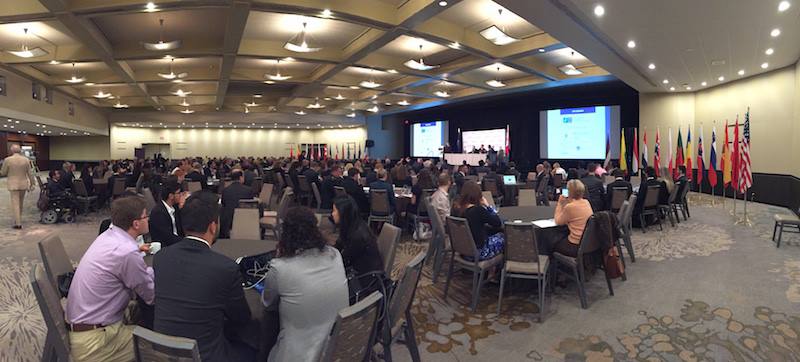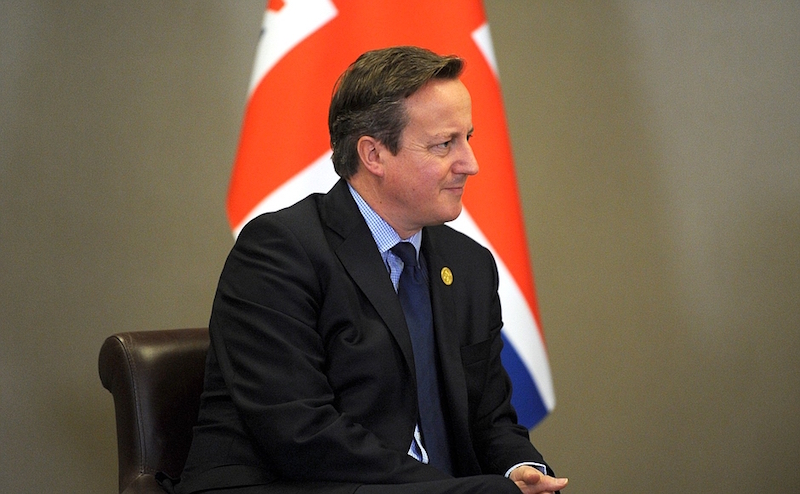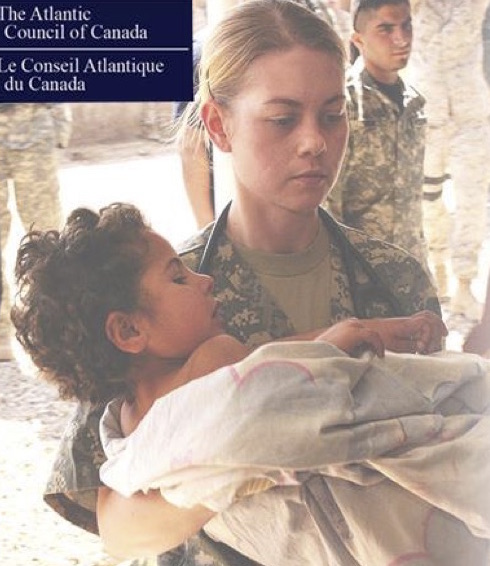Since 1954, the Atlantic Treaty Association (ATA) has worked to bring together a wide variety of members including diplomats, military personnel, academics, politicians, young professionals and students, with the common objective of working towards furthering the goals and values of the North Atlantic Treaty. Through research, training, education opportunities, analyses and dialogue, the ATA strives to promote and strengthen the transatlantic alliance with its members across a variety of avenues and events. The annual General Assembly of the ATA is one event in particular which gives participants the opportunity to engage in meaningful dialogue about the issues, world events and political dynamics which have an impact on the interests and goals of the Association and its members on both sides of the Atlantic. This year’s General Assembly, hosted by the NATO Association of Canada in Toronto, Ontario, did precisely this.
The NATO Association of Canada welcomed participants from over 20 countries to Toronto on October 11 and 12, 2016, to gather for two days of thought-provoking panels, keynotes, and discussion at the Westin Harbour Castle Hotel. Beginning with opening speeches and remarks on October 11, keynote addresses raised some common themes and issues, all of which were discussed extensively over the course of the conference. Participants were first welcomed by the NATO Association of Canada’s president, Mrs. Julie Lindhout, who introduced the Honourable Hugh Segal, Chairman of the NATO Association of Canada. Mr. Segal expressed his appreciation for a diverse group of participants, and challenged the audience to use the conference as an opportunity to both reflect on the importance of the Transatlantic Alliance, and consider the challenges that the Alliance faces today in a dynamic and uncertain international security landscape.
Following Mr. Segal’s opening remarks, Professor Fabrizio Luciolli, President of the Atlantic Treaty Association, addressed participants. Prof. Luciolli echoed several of Mr. Segal’s remarks, and stressed the importance of reflection and collective efforts in an international security environment characterized by increasingly complex actors, interconnected threats, and persistent challenges. Prof. Luciolli also encouraged conference participants to consider the unique nature of the hybrid threats which challenge international security currently, and how the Alliance might respond to these threats. Finally, Prof. Luciolli discussed the importance of the General Assembly. He highlighted the annual event as a critical opportunity for members of the Euro-Atlantic community to come together to foster cooperative relations, discuss critical policy decisions, and work towards cohesive responses to today’s complex security challenges.
Final words of welcome were delivered by Councillor Michael Thompson, who greeted participants from both Canada and abroad on behalf of the City of Toronto. He expressed his gratitude for a diverse group of conference participants travelling from across the Atlantic, and encouraged those visiting the city to take advantage of Toronto’s vibrant nightlife and dining opportunities. Following welcome speeches, keynote addresses were given by three distinguished guests who provided their own reflections on the current state of international security and the transatlantic community’s most pressing challenges.
The Honourable Stéphane Dion, Canada’s Minister of Foreign Affairs, spoke to the Audience about Canada’s continued involvement in Alliance activities overseas, and reiterated the importance of the General Assembly as an annual opportunity for reflection and collaboration in addressing present challenges and threats to international security. Mr. Dion expressed his gratitude to conference participants for dedicating themselves to two days of important dialogue and critical discussion, and encouraged the audience to bring these connections and findings back to their respective institutions and governments.
John Heffern, US Principal Deputy Assistant Secretary of State for European and Eurasian Affairs, delivered a keynote address which echoed similar themes to that of Mr. Dion. He highlighted the persistent need for greater collaboration and cohesive planning between parties on both sides of the Atlantic when addressing the realities of an evolving international security environment. Mr. Heffern also identified hybrid threats and the increasingly fragile political situation unfolding across the Middle East region as challenges which would continue to demand careful consideration, and the dedicated hard work of those in positions of leadership during this time.
Mr. James Appathurai, Deputy Assistant Secretary General for Political Affairs and Security at NATO, addressed participants on behalf of NATO headquarters in Brussels. He also expressed his appreciation for everyone who had travelled from both sides of the Atlantic to participate in the General Assembly, and encouraged participants to make the most of the event by connecting with attendees from diverse roles and involvements in international security. He highlighted the value of gaining different perspectives from other participants, and challenged the audience to have meaningful, constructive and important dialogue about the pressing issues of international security that will continue to have an impact on the transatlantic community in the future.
Following keynote addresses, presentations began with the first of four panel-style discussions covering a range of subject matter. Panel one, entitled “Setting The Scene”, was particularly valuable to all conference participants as a primer for topics and subject matter that would be addressed in greater detail during later panels. Moderated by Lieutenant General (Ret’d) Michel Maisonneuve, Academic Director at the Collège Millitaire Royal de St-Jean, the panel gave an excellent overview of the types of challenges and threats which will become increasingly relevant to the transatlantic community. Panelists Dr. Christian Leuprecht from the Department of Political Science at the Royal Military College of Canada, Ambassador David Wright, Kenneth and Patricia Taylor Distinguished Professor of Foreign Affairs at the University of Toronto’s Victoria College, and Dr. Benjamin Zyla from the School of International development and Global Studies at the University of Ottawa, spoke to a broad range of issues challenging international security presently. These issues, ranging from accommodating a growing population to the diversification of international actors in a globalized world, made for a highly engaging session, and the equally constructive question and answer period which followed.
Day one of the General Assembly also included meetings for the Youth Atlantic Treaty Association (YATA), which elected a new executive board on October 11, 2016. The YATA brings together young professionals and students from 36 member organizations who work towards building upon common interests in issues of international security policy through public education, research and analysis. The new executive board elected during this year’s ATA General Assembly includes incoming President G.L John Jacobs, Secretary General Magdalena Surma, Vice-President of Finance Rati Bakhtadze, Vice-President of Public Outreach Sunniva Rebekka Skjeggestad, Vice-President of Communications Zebulon Carlander, and Vice-President of Human Resources Ulrik Trolle Smed. Magdalena Surma lists the main goals of this year’s executive board as being focused on leading YATA’s youth network in fostering engagement in international affairs and security, while expanding national chapters. Additionally, she sees the board working closely on developing strong partnerships with students on an international scale. These mandates are well aligned with the goals and values of the ATA, making the YATA-ATA partnership a vital and mutually beneficial one by engaging students and young professionals in issues of international security and defence policy. This is critically important for maintaining membership and support for both the YATA and the ATA.
The first day of the General Assembly concluded with an official dinner event, welcoming all participants and guests to celebrate the 60th Anniversary of the Report of the Committee of Three. The dinner presentation, hosted by the Honourable Hugh Segal, detailed The Report of the Committee of Three in a presentation by Julie Lindhout, and gave guests a distinct appreciation for the work of Halvard Lange of Norway, Gaetano Martino of Italy, and Lester Pearson of Canada, in producing a report which contributed vitally to the establishment of the NATO Science Program. Speaking on behalf of the Pearson family, Lester Pearson’s granddaughter, Hilary Pearson, President of Philanthropic Foundations Canada, spoke to the legacy left by the Committee of Three in her response to the presentation. Day two of the General Assembly began bright and early with breakfast for all participants at the Westin Harbour Castle. Following a brief opening address from Prof. Luciolli, who congratulated participants on an engaging and constructive first day of conferencing, the second panel discussion was underway. Entitled “The Art of Diplomacy”, the second panel, moderated by Mr. Paul Chapin, Executive Editor of The Vimy Report, featured three esteemed panelists with unique perspectives on various issues of diplomacy and areas of conflict: Dr. Fen Hampson, Distinguished Fellow; Director of the Global Security and Politics Program, Co-Director of the Global Commission on Internet Governance, and Chancellor’s Professor at Carleton University; the Honourable Raynell Andreychuk of the Senate of Canada and Executive Member of the Canadian NATO Parliamentary Association; and Mark Gwozdecky, Assistant Deputy Minister of International Security and Political Affairs at Global Affairs Canada. The extensive experience and range of backgrounds represented on the panel made for an especially interesting discussion of timely issues concerning international security, specifically areas of violent conflict and extensive human displacement. Issues and potential challenges of military intervention, post-conflict reconstruction, and treaty negotiation were all subjects of critical dialogue and lively debate between the moderator and presenters on this panel, and sparked insightful audience questions following presentations.
Day two of the General Assembly also featured a keynote address by John McKay, Canada’s Parliamentary Secretary to the Minister of National Defence. Mr. McKay discussed the current political landscape on issues of international security and defence from the Canadian perspective, and outlined some key considerations and questions to guide meaningful dialogue on these issues for the remainder of the General Assembly.
Mr. McKay’s keynote address was followed by the General Assembly’s third panel entitled “Military Collaboration: Planning and Capacity Building”. Moderated by Professor Dr. Julian Lindley-French, Vice President of the ATA and Director of Europa Analytica, this panel discussed cooperative approaches to security and collective defence. Speakers on the panel included Dr. Duncan Stewart, General Manager of the Security and Disruptive Technologies Program at the National Research Council of Canada; Brigadier General Henrik Sommer, Assistant Chief of Staff Capability, Engineering and Innovation with HQ NATO Supreme Allied Commander Transformation; and Dr. Jon Lindsay, Assistant Professor of Digital Media and Global Affairs at the Munk School of Global Affairs, University of Toronto. Panelists examined several crucial decisions made during the Warsaw Summit on issues of collective defence in international security arrangements, and discussed the initiatives and prospects in place to implement these decisions. Analysis of upcoming advancements, especially technological developments, triggered a lively and enlightening debate which engaged audience members and panelists.
The final panel of the General Assembly addressed a wide range of important issues falling into the general category of economics. Moderated by Dr. Craig Stone, Director of Academics at the Canadian Forces College, panel four on “Economic Cooperation: The Road to Peace and Prosperity” focused on the implementation of Article 2 of the North Atlantic Treaty, and the multidimensional challenges associated with this article. Dr. David Carment, Professor at the Norman Patterson School of International Affairs at Carleton University; Mr. Edward Christie from the department of Economics and Security at NATO HQ; and the Honourable Pamela Wallin from the Senate of Canada, discussed a number of pressing issues surrounding economic security and stability, and NATO’s role in this delicate relationship. Examining points of intersection between international development and the phenomenon of failed and fragile states, panelists unpacked and discussed a multiplicity of factors contributing to unrest and instability in situations of state failure. They discussed the various challenges that NATO must consider when attempting to implement Article 2, and the implications of these challenges on NATO members. Discussion and audience questions that followed added perspective and insight to the complex issues discussed by the panel.
Closing ceremonies for the 62nd ATA General Assembly included parting remarks from ATA President Prof. Fabrizio Luciolli, and the Honourable Hugh Segal and Mrs. Julie Lindhout of the NATO Association of Canada. Prof. Luciolli congratulated participants on their hard work and attention the challenging issues and developments discussed over two full days of conferencing, and thanked attendees on behalf of the ATA for their continued dedication to issues of international defence, peace and security. Mr. Segal also shared words of thanks and appreciation for the hard work and excellent constructive dialogue contributed by all participants on behalf of the NATO Association of Canada, and Mrs. Lindhout concluded the day by recognizing everyone involved in the planning and hosting of the ATA General Assembly, and all of the dedicated hard work and collaboration that went into executing the event.
The 62nd ATA General Assembly provided an important opportunity for members of the transatlantic community to gather and collaborate over the pressing issues challenging international security. The insights and perspectives shared over the course of these two days made for truly constructive dialogue which will undoubtedly shape how members of the transatlantic community think about and respond to issues of security and defence in the future.. One only needed to take a walk around the conference room to observe this constructive dialogue in action, as General Assembly participants met with both old colleagues and new connections to share ideas, collaborate on upcoming initiatives, offer insight and advice to students and young professionals, and learn from one another’s diverse experiences. The knowledge and ideas shared during this year’s ATA General Assembly are a testament to the formidable work of the dedicated diplomats, military personnel, academics, politicians, young professionals and students who contributed to the conversation, and illustrates the important role of the General Assembly as a platform for reflection and progress for the ATA.
Disclaimer: Any views or opinions expressed in articles are solely those of the authors and do not necessarily represent the views of the NATO Association of Canada.




